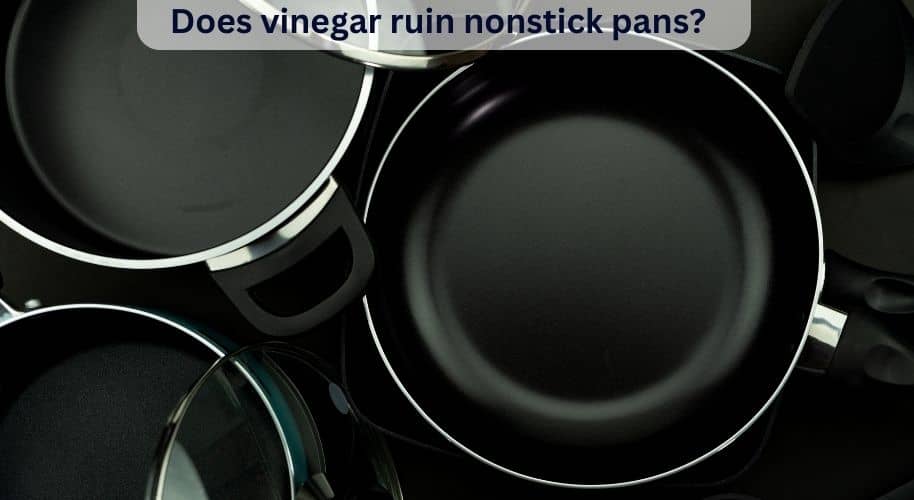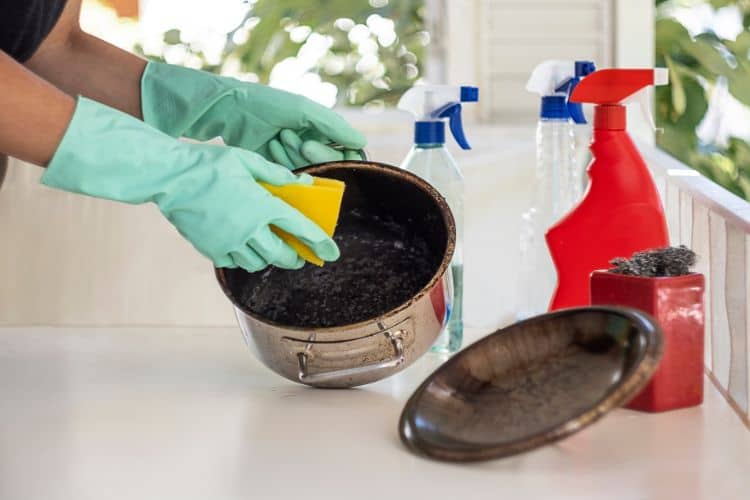Vinegar does not affect Standard PTFE/Teflon non-stick, But you should be careful with other ceramic or anodized aluminum types.
You can also use baking soda and white vinegar together for deeper cleaning. Do not let the vinegar directly contact the non-stick coating, as it may cause erosion and scraping.
In this blog post, we’ll discuss does vinegar ruin non stick pans and give tips on how to clean your non-stick cookware safely.
Whether you’re a home cook or a professional chef, read on to find out more about this crucial kitchen topic.

Does vinegar ruin nonstick pans?
As mentioned above, standard PTFE/Teflon non-stick surfaces are safe with vinegar. Other types of non-stick such as ceramic or anodized aluminum, are also safe from damage, but will vinegar hurt non stick pans?
“Vinegar is an incredibly powerful and acidic ingredient, so it should be used with care. When cleaning non-stick pans, never use anything too abrasive, like steel wool or scouring pads, as this can damage the surface,” said Michelin star chef Gordon Ramsay.
You should note that while vinegar won’t damage your nonstick pans, there are other ways you may be ruining them without knowing it.
For example, using cooking sprays like Pam instead of oil or butter can cause build-up on the pan’s surface over time, reducing its effectiveness and making it harder to clean.
Additionally, using metal utensils while cleaning non stick pans with vinegar can scratch or chip away at the surface, so try to use wooden or plastic utensils instead whenever possible.
Overall, you don’t have to worry about using vinegar on non stick pans – just ensure you’re taking proper care of them in other ways.
Can you use baking soda and vinegar on nonstick?
You can use Baking soda and vinegar to clean nonstick surfaces, but you should use the mixture carefully. Some of us asked that is vinegar bad for non stick pans ? The combination of baking soda and vinegar creates a reaction that can cause bubbling and foaming, which could damage your nonstick surface if you do it incorrectly.
To clean with baking soda and vinegar, mix one part baking soda with two parts white vinegar in a bowl. Apply the mixture to the nonstick surface with a damp cloth or nylon scrubber, then rinse off with warm water.
How do you clean a burnt nonstick pan?

Cleaning a burnt nonstick pan can be tricky, but with the right steps, you can do it easily. Here is a step-by-step guideline:
Step One
Begin by adding hot water, two tablespoons of white vinegar, and baking soda to a pan. Turn up the heat to bring the mixture to a boil and simmer for approximately 5-10 minutes.
Step Two
After that, you can use a wooden spoon or spatula to scrape off any remaining food residue. You can also mix baking soda with water or olive oil until it reaches the consistency of toothpaste and use this as an alternative green cleaning option.
Step Three
Finally, you can sprinkle some baking soda onto the burnt-on food surface area and pour a few tablespoons of water onto the baking soda before scrubbing away at the mixture of water with a sponge or cloth.
How do you make a nonstick pan nonstick again?
If your nonstick pan has lost its nonstick coating, you can make it nonstick again with a few simple steps.
- Wash the pan as usual, using warm soapy water and a soft sponge or cloth.
- Dry the pan completely with a clean towel.
- Rub a small amount of vegetable oil onto the surface of the pan using a clean cloth or paper towel.
- Place the pan upside down on a baking tray and place it in an oven preheated to 375°F (190°C). Bake for 1 hour and then allow to cool before use.
- Wipe away any excess oil with a paper towel before using the pan again.
By following these steps, you can restore your nonstick pan and make it as good as new!
Do you need to season nonstick pans after cleaning?
Seasoning your nonstick pans helps protect the surface and fill in any pits or inconsistencies that have developed. It also helps enhance the non-stick coating and make it last longer, but there is no rule for how often you should do it.
Some brands recommend seasoning once every few months, while others suggest doing so after each use. Ultimately, it’s up to you to decide what works best for your cookware needs.
How to care for non-stick pans?
To keep nonstick pans in tip-top condition, You should take care of them properly. Here are a few tips for doing so:
– Always use wooden or plastic utensils when cooking with nonstick surfaces. A metal spatula can scratch the surface and reduce its efficacy.
– Avoid using direct heat when cooking with nonstick pans; this can damage the surface and cause sticking. Instead, cook on medium heat.
– Don’t stack nonstick pans on each other as this could lead to scratching of the surfaces.
– To maintain a clean and shiny finish, wash your dirty nonstick by hand and use a soft sponge. Dishwashers can also be used but be sure to use the gentle cycle.
– Avoid harsh abrasives and scouring pads when cleaning food particles, as these can damage the nonstick surface.
– Before storing, ensure your pan is completely dry before wrapping or placing it in a cupboard.
– Always store your pans in a cool, dry place away from direct sunlight. This clever idea will help preserve the quality and life of the nonstick coating.
Wrapping Up
Thanks for reading this guide on does vinegar ruin non stick pans. We hope you’ve found this guide helpful.
To sum up, we just want to mention that it is possible to clean non-stick pans using vinegar but with caution. Experts recommend using vinegar in small amounts and mixing it with water when cleaning the pan, and always dry the pan completely before storing it.
By following these guidelines, you can ensure the longevity of your non-stick pans and enjoy them for a long time.
Please share this post with your friends and family so they can also learn how to care for their non-stick pans properly.
Sharing Is Caring!
You Might Also Like These Posts!
- How To Clean Burnt Non Stick Pan or Pot
- How do I stop the bottom of my pressure cooker from burning
- How do you fix a cloudy glass stovetop
- how to restore ceramic pan
- is hexclad cookware toxic?
My name is Lori Walker. I’m a registered dietitian, food blogger and food enthusiast. I share easy healthy, delicious recipes on my blog and review necessary kitchen items. The recipes I share take less… Read more
